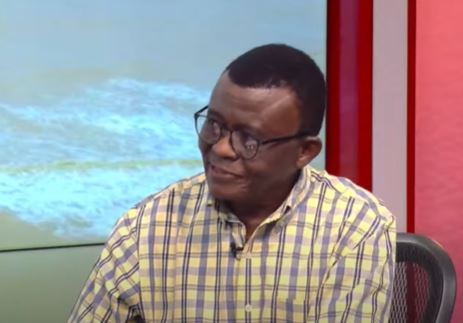A former UN Senior Governance Advisor, Professor Baffour Agyeman-Duah, has expressed concern about the government’s perception of the illegal mining (galamsey) crisis in the country.
He pointed out that while the public and various organisations are making efforts to combat galamsey through public statements, the government's understanding of the crisis appears to differ significantly.
Speaking on UpFront on Wednesday, September 11, Prof Agyeman-Duah voiced his disappointment with the statement issued by the Ministry of Lands and Natural Resources regarding the galamsey menace.
According to him, the government's statement failed to convey the gravity of the situation and questioned whether government officials are aware of the pollution of river bodies and destruction of lands.
"I wonder if these people do drive on our ways and they are alerted and they see the river bodies over which we drive on the bridges.
“...So for the government to issue this statement is a non-starter in my humble view. The problem is huge and I think the government has been lacking the nerves to tackle it over the years to a point where it has completely gone out of control,” he said.
His comment follows the statement issued by the Lands Ministry on Wednesday, September 11, reiterating the government's commitment to promoting sustainable and legal mining practices in Ghana.
The ministry stressed that responsible mining remains a priority to protect the environment and ensure the well-being of communities impacted by mining activities.
The statement further noted that following a high-level meeting on Wednesday, stricter guidelines were issued to all Regional Ministers and their security councils to strengthen the fight against illegal mining.
In light of this, Prof Agyeman-Duah criticised the government's approach of fighting against galamsey by working through regional ministers as “useless.”
He argued that the country’s centralised governance system has been ineffective in resolving the crisis.
“We have a centralised government and it’s what the government or the president wants is what the ministers will do in the region. They represent the president, the same with the District Chief Executives and that tells you how this centralised governance system we have is failing us.
“Those in the districts and the regions are almost powerless in enforcing measures unless the national government takes the action so this statement that you just read, for me it’s a non-starter,” he said.
Latest Stories
-
When Gold Becomes Poison, and the Foolish Cut Down the Tree with the Shade
4 minutes -
Portugal beat Spain on penalties to win second Nations League title
1 hour -
Ending galamsey requires national will, not new laws – Legal expert
3 hours -
APSU-USA urges government to restore Catholic Church’s role in school management
3 hours -
Ghana ranked 9th in Africa with highest outstanding loans to China
3 hours -
OMCs to implement GH¢1.0 Energy Sector Levy from June 16, 2025
4 hours -
T-bills auction: Government fails to meet target; but rejects GH¢1.095bn of bids
4 hours -
NPP doesn’t give chance to non-performing candidates – Kennedy Agyapong
4 hours -
Roland Garros: Alcaraz completes epic comeback against Sinner to claim title
4 hours -
Obaasima donates over 2,000 sanitary pads to mark Menstrual Hygiene Day, empowering girls in Western Region
5 hours -
Tension in Effiduase as family rejects destoolment of chief who resisted controversial sale of COVID-19 cemetery land
6 hours -
Hamburg Sustainability Conference 2025 concludes with new global alliances and concrete commitments for a sustainable future
6 hours -
GPL 2024/25: Hearts of Oak beat Samartex to finish fourth
6 hours -
GPL 2024/2025: Bechem United clinch win in final home match against Young Apostles
6 hours -
GPL 2024/25: Asante Kotoko end season in fifth after Vision FC defeat
6 hours

